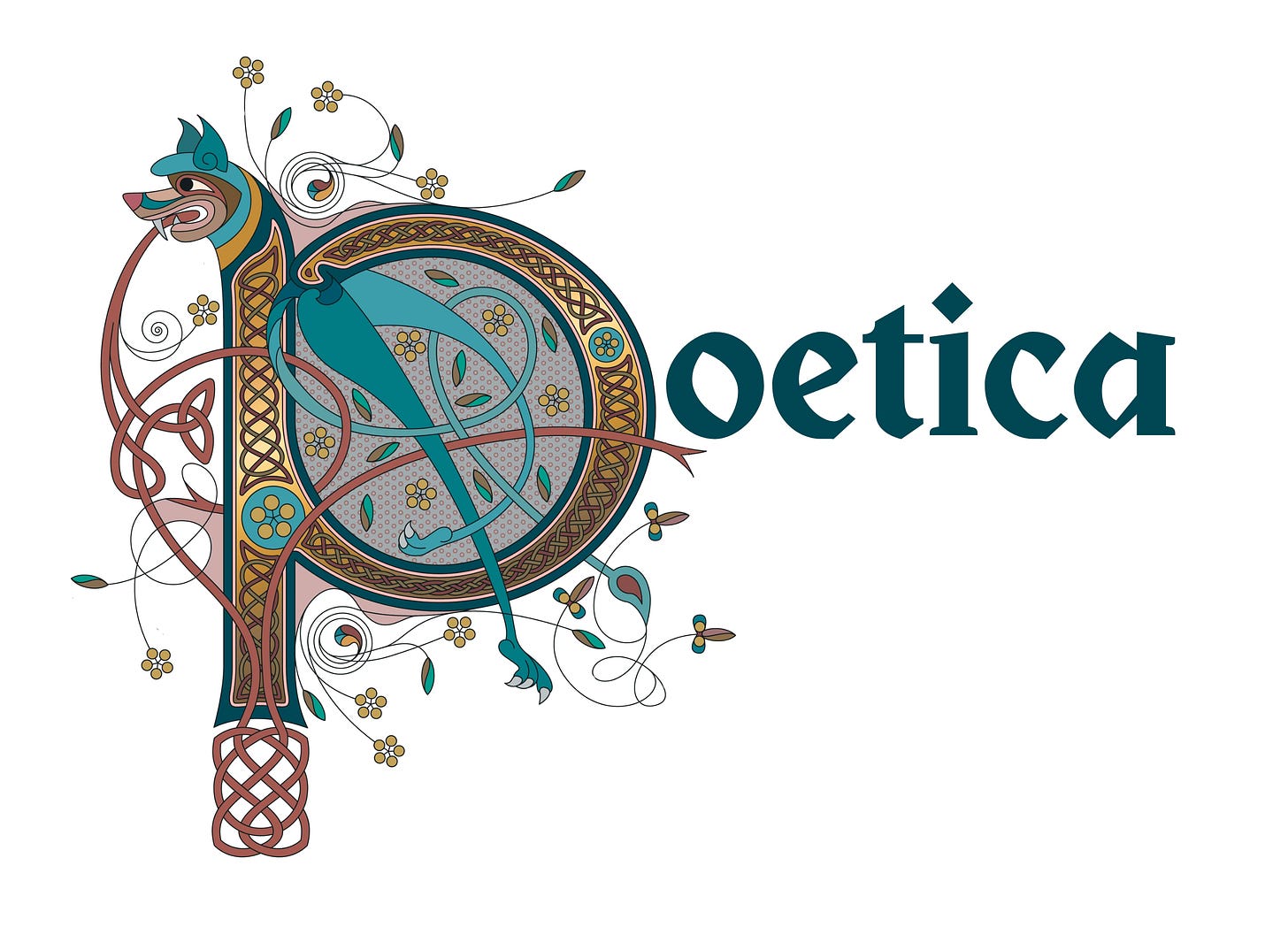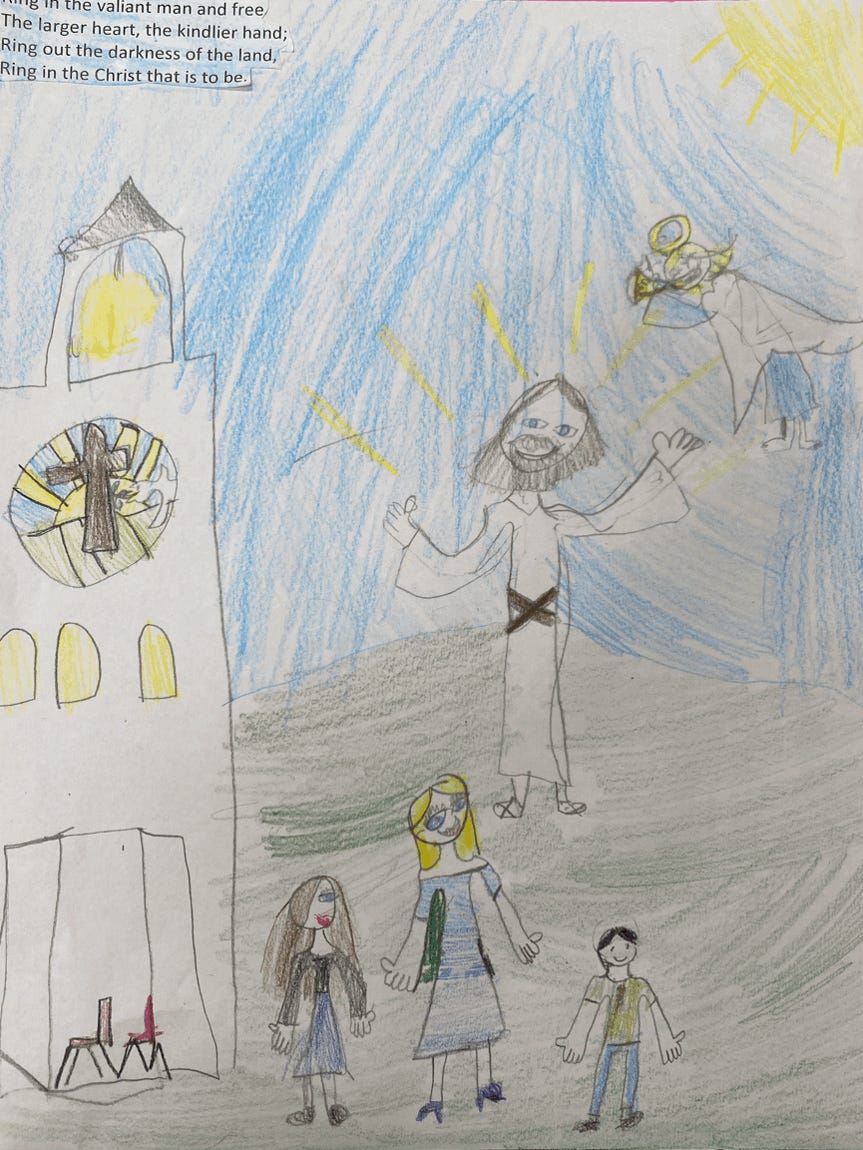Welcome to Poetica, the monthly poetry column of Shadowlands Dispatch for paid Substack subscribers and members of The Society for Women of Letters. As 2024 comes to an end, we are pleased to feature a fitting poem by Alfred, Lord Tennyson called “Ring Out, Wild Bells,” followed by an analysis and reflection from Karise Wright.
Every year, Karise invites her third graders at Covenant Classical School in Forth Worth, Texas, to illustrate “Ring Out, Wild Bells.” We’re excited to share some of their illustrations with you throughout her commentary. The Leadership Council of The Society for Women of Letters wishes you a happy new year and hopes “Ring Out, Wild Bells” and the illustrations included will inspire your own creativity and reflection as we enter 2025.
“Ring Out, Wild Bells”
By Alfred, Lord Tennyson (August 6, 1809—October 6, 1892)
Ring out, wild bells, to the wild sky,
The flying cloud, the frosty light;
The year is dying in the night;
Ring out, wild bells, and let him die.
Ring out the old, ring in the new,
Ring, happy bells, across the snow:
The year is going, let him go;
Ring out the false, ring in the true.
Ring out the grief that saps the mind,
For those that here we see no more;
Ring out the feud of rich and poor,
Ring in redress to all mankind
Ring out a slowly dying cause,
And ancient forms of party strife;
Ring in the nobler modes of life,
With sweeter manners, purer laws.
Ring out the want, the care, the sin,
The faithless coldness of the times;
Ring out, ring out my mournful rhymes.
But ring the fuller minstrel in.
Ring out false pride in place and blood,
The civic slander and the spite;
Ring in the love of truth and right,
Ring in the common love of good.
Ring out old shapes of foul disease,
Ring out the narrowing lust of gold;
Ring out the thousand wars of old,
Ring in the thousand years of peace.
Ring in the valiant man, and free,
The larger heart, the kindlier hand;
Ring out the darkness of the land
Ring in the Christ that is to be.
Analysis and Reflection
By Karise Wright
In Alfred, Lord Tennyson’s In Memoriam: “Ring out Wild Bells,” the Poet Laureate of England during much of Queen Victoria’s Reign expressed his grief over the loss of his close friend, Arthur Henry Hallam. “Ring Out Wild Bells” was part of his larger grief-work, In Memoriam, concentrating on his sorrow during the Christmas season. From 1833 until the work’s completion and publication in 1850, Tennyson compiled these poems of loss and mourning. Named for the traditional ringing of the bells that marked the passing of the old year and the entrance into the new, “Ring Out, Wild Bells” remains one his most famous poems.
Why do these “wild bells” continue to ring true? This poem is a particular favorite of mine because, at the classical Christian school where I teach, our third grade class memorizes and recites it together for winter recitation. The connection of the poem’s rhythm to its message is a delight for the ears and tongue when read aloud. The rhythm and repetition of “ring in” and “ring out” throughout the poem mimic the sounds of the church bells themselves, pealing in a cadence that reinforces the message of ultimate hope in the face of deep grief.
Hope is where Tennyson is headed as we ring out this old year and ring in the new. His grief becomes less personal, expanding as he rings out not only his grief for his friend, but his specific grief for a larger, broken world. He does not pretend the world is perfect. The light is “frosty,” and the sky is “wild.”
He reflects and rings out “old shapes of foul disease,” “narrowing lust of gold,” and “the thousand wars of old.” He rings out “the false,” “the feud of rich and poor,” and “ancient forms of party strife.” He rings out “the civic slander and the spite.” He rings “out the want, the care, the sin,” and “The faithless coldness of the times.” The bells strike twice, quickly in succession, as he “ring[s] out, ring[s] out” his “mournful rhymes.”
But all this ringing out leaves neither the man nor the bells to hang in silence, for Tennyson rings in “the nobler modes of life / with sweeter manners, purer laws.” He rings in a tune to set it all right: “redress to all mankind.” He rings in “the love of truth and right” and “the common love of good.” He rings in “the thousand years of peace.” He understands this is not a tune that a man can compose for himself; he ultimately “rings the fuller minstrel in.”
The last stanza names this minstrel: Christ. In order to “ring out the darkness of the land,” we must “Ring in the valiant man and free.” It’s precious to hear children “ring in the Christ that is to be,” knowing that some of them have genuinely suffered “grief that saps the mind / For those that here we see no more.” These are words to guide young hearts in an era of certain “civic slander and spite.”
“Ring Out, Wild Bells” does not leave us in a deliberate dirge but readies our “larger heart” and “kindlier hand” to “Ring out the false, ring in the true.” The “wild bells” that ring in Tennyson’s poem are deliberate measures to the old troubles that are rung out. It is in remembering, ringing out, “let[ing] him go,” and then ringing in hope, that we “Ring in the Christ that is to be.”
—Karise Wright holds a BA in English from Southern Methodist University and an MA in Cultural and Imaginative Apologetics from Houston Christian University. She fell in love with classical education when her oldest daughter was in kindergarten and, after 17 years, is still enchanted by goodness, truth, and beauty. She consumes copious amount of time (and coffee!) keeping up with her college-aged daughters, rescuing her cats from impending peril, and writing classical poetry. She is recently married to the love of her life, dashing archaeologist Ted Wright. She currently teaches the most amazing third graders at Covenant Classical School in Forth Worth, Texas.









Those sweet, sweet pictures!! This is a beautiful poem and reminder for hope of a new year and its Minstrel, even in February, when I'm first encountering your post.
Thank you for this lovely poem.